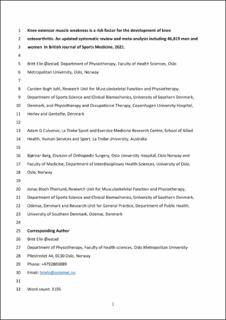| dc.contributor.author | Øiestad, Britt Elin | |
| dc.contributor.author | Juhl, Carsten Bogh | |
| dc.contributor.author | Culvenor, Adam G. | |
| dc.contributor.author | Berg, Bjørnar | |
| dc.date.accessioned | 2022-01-25T14:42:41Z | |
| dc.date.available | 2022-01-25T14:42:41Z | |
| dc.date.created | 2022-01-18T11:55:26Z | |
| dc.date.issued | 2021 | |
| dc.identifier.issn | 0306-3674 | |
| dc.identifier.uri | https://hdl.handle.net/11250/2839290 | |
| dc.description.abstract | Objective To update a systematic review on the association between knee extensor muscle weakness and the risk of incident knee osteoarthritis in women and men.
Design Systematic review and meta-analysis.
Data sources Systematic searches in PubMed, EMBASE, SPORTDiscus, CINAHL, AMED and CENTRAL in May 2021.
Eligible criteria for selecting studies Longitudinal studies with at least 2 years follow-up including baseline measure of knee extensor muscle strength, and follow-up measure of symptomatic or radiographic knee osteoarthritis. Studies including participants with known knee osteoarthritis at baseline were excluded. Risk of bias assessment was conducted using six criteria for study validity and bias. Grading of Recommendations Assessments, Development and Evaluation assessed overall quality of evidence. Meta-analysis estimated the OR for the association between knee extensor muscle weakness and incident knee osteoarthritis.
Results We included 11 studies with 46 819 participants. Low quality evidence indicated that knee extensor muscle weakness increased the odds of symptomatic knee osteoarthritis in women (OR 1.85, 95% CI 1.29 to 2.64) and in adult men (OR 1.43, 95% CI 1.14 to 1.78), and for radiographic knee osteoarthritis in women: OR 1.43 (95% CI 1.19 to 1.71) and in men: OR 1.39 (95% CI 1.07 to 1.82). No associations were identified for knee injured populations except for radiographic osteoarthritis in men.
Discussion There is low quality evidence that knee extensor muscle weakness is associated with incident symptomatic and radiographic knee osteoarthritis in women and men. Optimising knee extensor muscle strength may help to prevent knee osteoarthritis. | en_US |
| dc.language.iso | eng | en_US |
| dc.publisher | BMJ Publishing Group | en_US |
| dc.rights | Navngivelse-Ikkekommersiell 4.0 Internasjonal | * |
| dc.rights.uri | http://creativecommons.org/licenses/by-nc/4.0/deed.no | * |
| dc.title | Knee extensor muscle weakness is a risk factor for the development of knee osteoarthritis: An updated systematic review and meta-analysis including 46 819 men and women. | en_US |
| dc.type | Peer reviewed | en_US |
| dc.type | Journal article | en_US |
| dc.description.version | acceptedVersion | en_US |
| cristin.ispublished | true | |
| cristin.fulltext | original | |
| cristin.qualitycode | 2 | |
| dc.identifier.doi | 10.1136/bjsports-2021-104861 | |
| dc.identifier.cristin | 1983428 | |
| dc.source.journal | British Journal of Sports Medicine | en_US |

